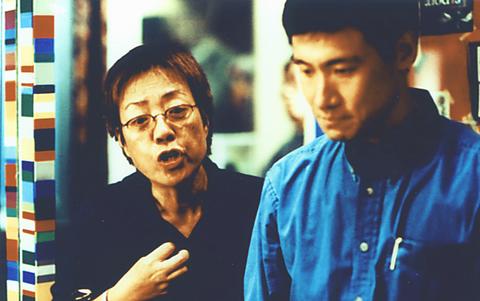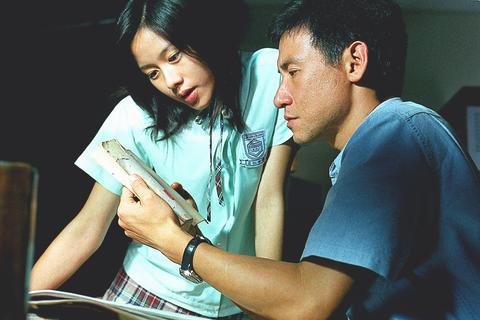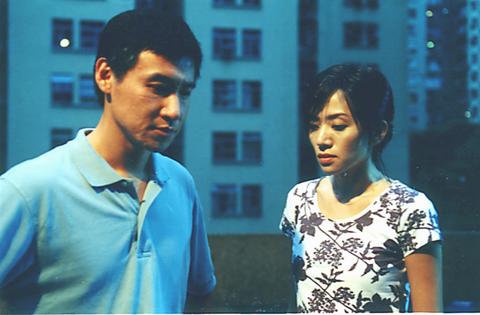After making the atmospheric Visible Secret (2001), veteran Hong Kong director Ann Hui
With July Rhapsody Hui embarks on an exploration of middle age. Ironically perhaps, the real star and linchpin of the story is the young Choy-lam (Karena Lam), a contemporary Hong Kong Lolita, who wreaks havoc on the already fragile structure of the marriage between Yiu-kwok (Jacky Cheung,
Married for 20 years and feeling the fire of passion flickering out, Yiu-kwok finds it hard to resist the in-your-face advances of one of his most precocious students. His married life has a secret sorrow which casts a shadow over his relationship with his wife. His eldest child is not actually his, but the offspring of a favorite teacher who fled Hong Kong for Taiwan after making Man-ching pregnant, leaving Yiu-kwok to pick up the pieces.

PHOTO COURTESY OF GROUP POWER
The old teacher, called Seng, his marriage broken and in poor health, returns to Hong Kong to die. Man-ching feels obliged to see him through his final days. "So I can finally forget him," she says. The fact that love and hatred are rarely taken straight, but are usually a complex cocktail with an indefinable flavor is a thread that runs through July Rhapsody.
Mui manages to look both haggard and a competent housewife in a role that does not seek to elicit pity and is all the more powerful for that. There is a maturity to her performance, which always comes as a bit of a surprise given the number of very silly Hong Kong flicks she also plays in. This small-budget role only confirms her as one of the grand dames of Hong Kong cinema, if confirmation was needed.
Thin, almost emaciated, she is a powerful contrast to Karena Lam with her rounded curves and pouty face that does so much to disturb the peace of mind of Yiu-kwok and command the attention of the audience. She wears her sexually provocative posturing easily, and one of the greatest pleasures of the film is to watch it flicker back and forth between school girl teasing and sexual hunger. Telling Yiu-kwok that she is leaving school to start a business, she teases that, "I can still wear my school uniform if you find it sexy," showing her total command of her own sexuality and a self-confidence that Yiu-kwok has lost in the course of his own life. The days when he was a high-flying student seem very distant and tainted by history.

PHOTO COURTESY OF GROUP POWER
Lam's is not a big role, and may not really have deserved the double award for both Best Supporting Actress and Best New Performer that she picked up at the Golden Horse Film Festival last week. All the same, the pleasure she so clearly takes in her work and the effervescent sparkle of her eyes are what lift what would otherwise be a rather heavy domestic drama into something better and more playful.
Jacky Cheung has aged well, and has something of the Richard Gere good looks which could go a long way to annoying some audiences. His ease in the classroom and his ability to win the affection of his students even while taking them through some deathly tedious Chinese classics is very facile and plays off beautifully against his confusion when faced with Choy-lam's advances. He is the passive partner in all this, the hesitant one, a poor soul caught between lust, fear and his undoubted moral rectitude. The scenes between him and Lam have a deep sadness about them as the caution and memory of middle age are brought face to face with the carelessness and confidence of youth.
There is so much that is good about July Rhapsody that it is not easy to work out what is wrong with it, but ultimately it doesn't quite come off. In its mood of repressed sexuality, some comparisons might be made with In the Mood for Love

PHOTO COURTESY OF GROUP POWER
Ivy Ho
That Yiu-kwok is a child of the Chinese classics establishes a context that is used ironically, with its high sentiments at odds with Seng's betrayal and cowardice. China and the cultural values it embodies are cast against a modern world in which ethnic fashions and high technology have become dominant. This is all kept in the background, but creates a minor theme that continues over from Comrades, and marks it as part of an increasingly strong corpus of works about Chinese identity among the Chinese diaspora.

June 23 to June 29 After capturing the walled city of Hsinchu on June 22, 1895, the Japanese hoped to quickly push south and seize control of Taiwan’s entire west coast — but their advance was stalled for more than a month. Not only did local Hakka fighters continue to cause them headaches, resistance forces even attempted to retake the city three times. “We had planned to occupy Anping (Tainan) and Takao (Kaohsiung) as soon as possible, but ever since we took Hsinchu, nearby bandits proclaiming to be ‘righteous people’ (義民) have been destroying train tracks and electrical cables, and gathering in villages

Swooping low over the banks of a Nile River tributary, an aid flight run by retired American military officers released a stream of food-stuffed sacks over a town emptied by fighting in South Sudan, a country wracked by conflict. Last week’s air drop was the latest in a controversial development — private contracting firms led by former US intelligence officers and military veterans delivering aid to some of the world’s deadliest conflict zones, in operations organized with governments that are combatants in the conflicts. The moves are roiling the global aid community, which warns of a more militarized, politicized and profit-seeking trend

The wide-screen spectacle of Formula One gets a gleaming, rip-roaring workout in Joseph Kosinski’s F1, a fine-tuned machine of a movie that, in its most riveting racing scenes, approaches a kind of high-speed splendor. Kosinski, who last endeavored to put moviegoers in the seat of a fighter jet in Top Gun: Maverick, has moved to the open cockpits of Formula One with much the same affection, if not outright need, for speed. A lot of the same team is back. Jerry Bruckheimer produces. Ehren Kruger, a co-writer on Maverick, takes sole credit here. Hans Zimmer, a co-composer previously, supplies the thumping

Dr. Y. Tony Yang, Associate Dean of Health Policy and Population Science at George Washington University, argued last week in a piece for the Taipei Times about former president Ma Ying-jeou (馬英九) leading a student delegation to the People’s Republic of China (PRC) that, “The real question is not whether Ma’s visit helps or hurts Taiwan — it is why Taiwan lacks a sophisticated, multi-track approach to one of the most complex geopolitical relationships in the world” (“Ma’s Visit, DPP’s Blind Spot,” June 18, page 8). Yang contends that the Democratic Progressive Party (DPP) has a blind spot: “By treating any